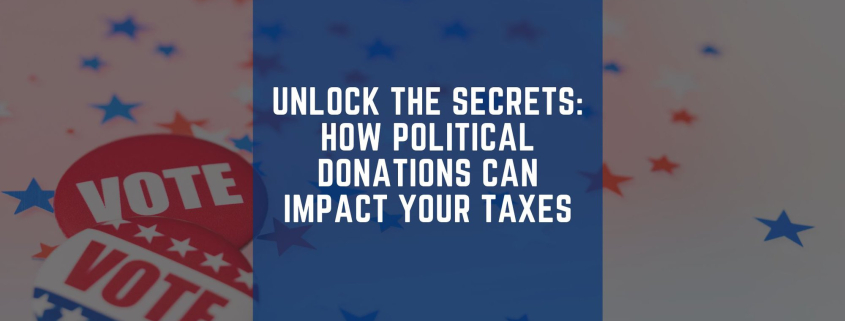Unlock the Secrets: How Political Donations Can Impact Your Taxes
- Understanding Political Donations
- Learn about Donating Time and Out of Pocket Expenses
- Analyze Strategies for Tax-Efficient Political Giving
In the intricate world of tax law, political donations occupy a unique space, blending civic engagement with financial implications. As taxpayers consider supporting their preferred political causes or candidates, understanding the tax aspects of these contributions is crucial. This article delves into the tax treatment of political donations, the distinctions between charitable contributions and political donations, and strategies for tax-efficient political giving.
Understanding Political Donations
Political donations can be made to candidates, parties, PACs, and 527 organizations. Each entity has a distinct political role. From a tax perspective, contributions to them are not tax-deductible on federal returns. Donating time or effort to campaigns, candidates, or PACs is also not tax-deductible.
Out-of-pocket costs incurred assisting these groups are not deductible either. However, expenses related to volunteering for qualified nonprofit charitable organizations are tax-deductible if you itemize your deductions.

Tax Treatment of Political Donations
The Internal Revenue Service (IRS) does not allow taxpayers to deduct political donations as charitable contributions. This is because the organizations that receive these donations do not qualify as charitable organizations under Section 501(c)(3) of the Internal Revenue Code. Instead, many political organizations are classified under Section 527, which includes political parties, candidates' campaign organizations, and political action committees.
The primary reason for the non-deductibility of political donations is the principle that tax deductions should not subsidize political activity. The tax code is designed to encourage donations to organizations that serve the public good in a non-partisan manner, such as charities, educational institutions, and religious organizations.
A few states allow a limited tax credit for political donations.
Reporting and Disclosure Requirements
While political donations are not tax-deductible, they are subject to reporting and disclosure requirements. For instance, federal law requires political campaigns and PACs to report the identities of donors who contribute more than a certain threshold amount. This transparency aims to prevent undue influence and ensure the integrity of the political process.
Additionally, individuals who make substantial donations to political organizations may need to file a Form 709, United States Gift (and Generation-Skipping Transfer) Tax Return if their contributions exceed the annual exclusion for gift tax purposes. For 2024 the annual gift tax exclusion is $18,000, up from $17,000 in 2023. However, it's important to note that most individual political donations do not reach the threshold that would trigger gift tax reporting.
Charitable Contributions vs. Political Donations
It's essential to distinguish between charitable contributions and political donations. Charitable contributions are made to organizations that are tax-exempt under Section 501(c)(3) of the Internal Revenue Code. These donations are generally tax-deductible and subject to certain limitations based on the donor's adjusted gross income. In contrast, political donations, as previously mentioned, do not qualify for a tax deduction.
This distinction underscores the importance of verifying the tax-exempt status of any organization before donating, especially if the donor intends to claim a tax deduction. The IRS provides tools and resources for taxpayers to check the exempt status of organizations.
Strategies for Tax-Efficient Political Giving
Direct political donations are not tax-deductible, but there are tax-efficient ways to support political causes. One strategy is to donate to non-partisan 501(c)(3) organizations that align with your political beliefs.
These non-profits advocate for policy issues without supporting political candidates or parties, offering societal impact and tax benefits. Another approach is using donor-advised funds (DAFs) for charitable contributions. Contributions to DAFs provide a large charitable deduction in high-income years.
While DAFs can't make direct political donations, they can support non-profits involved in policy research and education. Donors get an immediate tax deduction for DAF contributions, and funds can be distributed over time.
If you have questions or need assistance, schedule a consultation with a Fiducial advisor at https://fiducial.com/consultations.
Know someone who might need our services? We love referrals!









